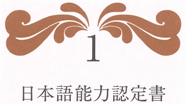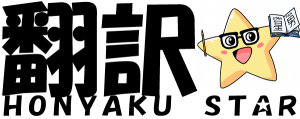Today I’m launching Honyaku Star, a new online Japanese/English dictionary.
The goal of Honyaku Star is to be the world’s most comprehensive free, online Japanese/English dictionary and corpus. Honyaku Star is built on top of numerous excellent community dictionaries, and adds to it the Honyaku Star dictionary, which tries to fill in everything else that isn’t in those general dictionaries, with the goal to be the best, and only dictionary you need.
Honyaku Star is more than a dictionary, it is also a Japanese/English bilingual corpus. In other words, a database of parallel texts to provide context, usage, and examples of words and phrases you search for. Many words have lots of valid translation varieties, and seeing it used in various different contexts can help you understand the different meanings and pick the appropriate usage. When you search in Honyaku Star, you get dictionary results and example sentences together.
I built Honyaku Star because I use online Japanese/English dictionaries every day, and none of them satisfied me. There are certain things I want, and don’t want out of an online Japanese/English dictionary. So, I built Honyaku Star based on the principles I think are important.
- Dictionaries and language resources should be free and easily accessible.
- The one and only dictionary advanced students and translators will need.
- Lots of relevant results for a search query. 1,000 results if possible.
- Provide in-context usage and examples sentences.
- Clean, simple user interface.
- No pagination in the UI.
- Searches should be super fast. Instantaneous!
- No visual distractions. No ads. No random Web content. No useless information like character encoding codes.
- No advanced search! It should be smart and bring back results in an intelligent way.
- The primary goal of a searchable dictionary is to be a useful language resource–it should not a means to draw you in and sell you language services or books.
I think I’ve kept with my design principles on this initial version, and it’s only going to get better with time.
The technology behind Honyaku Star is Linux, PHP, Perl, MySQL, and the awesome full-text index Mroonga. I’ll post more about some of the technical challenges in future posts.
Honestly, I made Honyaku Star for myself, to be the ideal dictionary that I’d want to use everyday. But my hope is others will find it useful. All user feedback is welcome and appreciated. And if you use and like Honyaku Star, consider contributing translations to it.
Start using Honyaku Star today at http://honyakustar.com.





Thank you for developing such a wonderful site.
I like it not only because I’m one of the developers of groonga.
I translated some sentences of this entry into Japanese,
and added it to the following page as the introduction of HonyakuStar.
http://mroonga.github.com/ja/users/
Please let me know if you find any problem with it.
Hi Daijiro,
Thanks for the compliment, and thanks for adding the link on the Mroonga home page. I should thank you for developing Mroonga. Without Mroonga, Honyaku Star would not be possible!
Fantastic! I see HonyakuStar has been around for more than six months now, but I have just come upon it today. As a professional translator, this is a very promising tool. Thank you!
Thanks for this search option, looks fine.
What I would like to know and suggest are:
– which corpus did you use
– is there a chance that you include morphological analysis (finding 食べる when searching for 食べられました)
Thanks a lot
Norbert
Hi Norbert,
Thanks for using Honyaku Star.
Honyaku Star has many corpora included in the search database. Some are community corpora that are freely available and some are original that have been (and are still being) compiled just for HYS. More detailed information is available on the HYS about page.
For now searches return literal results. This makes search results come back extremely fast, which is one of the main design goals of HYS. I am always looking for ways to make HYS even better, and if I can do it while maintaining search speed, I’ll consider adding the functionality.
Thanks for your comments.
Up until now, I have been using SpaceALC and Weblio for my collocations and technical terms. I am excited to try out Honyaku Star. The speed and simplicity alone are excellent. I’m not sure how you’re managing to finance or maintain this.
Do you suppose it will become possible in the future to mark a search term as appearing at the beginning, end, or anywhere in the word?